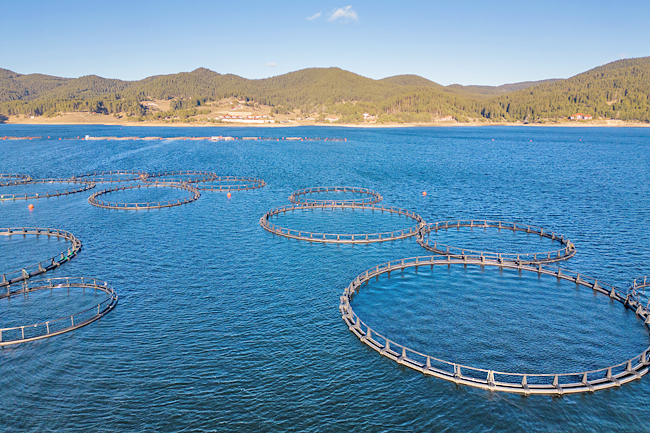Danial Norjidi
The World Economic Forum (WEF) recently launched a new roadmap that aims to strengthen sustainable growth in aquaculture.
The Global Sustainable Aquaculture Roadmap: Pathways for Systemic Change was launched through the WEF’s Blue Food Partnership, in collaboration with FUTUREFISH and the Aquaculture Stewardship Council and in consultation with the Partnership’s Sustainable Aquaculture Working Group.
The Blue Food Partnership, as described on the WEF website, works with its members to integrate the critical role of blue foods – food from aquatic sources – “in sustainability narratives at a policy level in international fora and identify and scale pre-competitive initiatives on priority blue food topics”.
According to a WEF press statement, blue foods – from the ocean, rivers and lakes – are the most highly traded food products in the world and provide livelihoods for millions of people as well as healthy and nutritious food for billions.
“Many types of blue foods also have lower carbon footprints than terrestrial food production and are critical to ensuring climate resilience as well as global food and nutrition security.
Demand for these foods is expected to double by 2050 and much of this demand will be met through aquaculture production.”

The statement describes the roadmap as “an important guide for transformative action in aquaculture value chains and the sector overall”.
It also notes that, like all food systems, aquaculture presents both opportunities and challenges. “Some current aquaculture practices have a negative impact on habitats and communities, and significant progress is needed to realise sustainable growth while also making a broad contribution on the 2030 United Nation (UN) Sustainable Development Goals. Increased production must be undertaken from a nature-positive perspective to preserve critical habitats and biodiversity.”
The Roadmap highlights that there is a great deal of work to be done by 2030 and more to do in the years that follow. “Companies in the aquaculture sector will need to work in partnership and take concrete actions, alongside regulators, certifiers, policy-makers, investors, non-governmental organisations (NGOs) and intergovernmental organisations (IGOs), to create an environment conducive to change.”
Using a systems change approach, the roadmap identifies four key pathways for action that it says can create change at scale and shift aquaculture systems towards a more sustainable future.
One key pathway for action is responsible production. As the roadmap elaborates, “With growing demand for blue foods, a planet-first approach to production can ensure that the long-term supply of nutritious and healthy food from aquaculture can be sustained. The diversity of aquaculture species and systems is key to underpinning resilience and the nutritional values of aquaculture in food systems.
“There is a need to develop and share best practices and innovations for sustainable production, which boost diversity of supply, allow inclusive growth, enhance nature-positive outcomes and contribute to global biodiversity goals.”
A second identified key pathway is better livelihoods. “There is an imbalance in benefits and risks among people participating in the aquaculture sector. The people working across value chains and the communities impacted by the industry are often left out of decisions that can negatively affect their lives and well-being. With the growth of aquaculture comes livelihood opportunities, but more needs to be done to secure those opportunities, especially for women and young people.
“Systemic change is crucial to rebalancing inequalities, empowering collaboration and community cooperatives, reducing poverty and building a more just sector for people across value chains.”
Another pathway mentioned is that of healthy consumption.
“Around the world, access to nutritious and healthy blue foods varies. A pivotal part of building sustainable aquaculture systems that address the growing demand for blue foods is improving the availability, access and affordability of these diverse blue foods to all consumers. Lowertrophic species – which require inexpensive and carbon-neutral feeds – can provide affordable and sustainable options for consumers.
“Advocates need to raise awareness among retailers, distributors and food service providers about the benefits of a variety of blue foods. Businesses need to find responsible solutions that allow all consumers to access the health benefits of nutritious blue foods.”
The fourth and final key pathway shared is an enabling environment. As the roadmap explains, “The future of food, health and ecological systems requires a change in the business of aquaculture. To achieve the pathways of responsible production, better livelihoods and healthy consumption, policies, partnerships, certifications, innovations and investments are needed for aquaculture to sustainably grow and deliver on its potential for social, economic and environmental opportunity for all. The actions and outcomes in this enabling pathway will create the right conditions to make positive progress towards sustainable, inclusive and healthy aquaculture by the end of this decade, providing a solid foundation for the future.”
The roadmap proceeds to highlight that there are many ways to take action. It adds that all those committed to the vision of a more socially, economically and environmentally sustainable future for aquaculture should consider how the roadmap applies to their unique efforts, context and geography.
“As the aquaculture sector evolves, the hope is that this roadmap can serve as foundational guidance for change.”
Meanwhile, in a statement, Director of Ocean Action Agenda and Friends of Ocean Action at WEF Kristian Teleki said, “Meeting our increasing demand for healthy and nutritious food in more sustainable ways is a monumental challenge, yet great potential lies in the water.
“Blue foods from our ocean, rivers and lakes are the most highly traded food products in the world and already provide livelihoods for many millions as well as healthy and nutritious food for billions. This roadmap will ensure we are on a sustainable and ethical pathway to producing more food for an increasingly hungry planet.”





